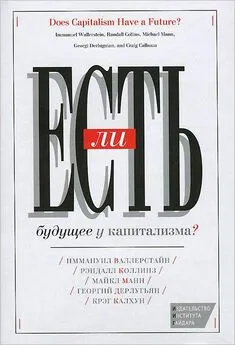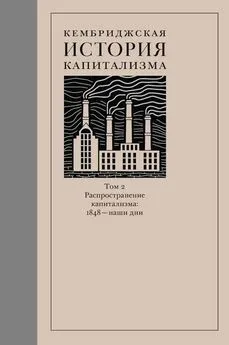Лестер Туроу - Будущее капитализма
- Название:Будущее капитализма
- Автор:
- Жанр:
- Издательство:Сибирский хронограф
- Год:1999
- ISBN:5-87550-085-9
- Рейтинг:
- Избранное:Добавить в избранное
-
Отзывы:
-
Ваша оценка:
Лестер Туроу - Будущее капитализма краткое содержание
Один из ведущих американских экономистов детально анализирует ближайшие и отдельные последствия фундаментальных социально-экономических сдвигов конца XX века: распада коммунистической системы и перемен в странах бывшего социалистического лагеря; развития интеллектуальных технологий; радикального изменения демографической картины мира и др.
В книге даётся анализ глобальной экономики и её движущих сил.
Будущее капитализма - читать онлайн бесплатно полную версию (весь текст целиком)
Интервал:
Закладка:
33. Mishel and Bernstein, The State of Working America 1992–1993, p. 72.
34. Tamar Lewin, «Mom Is Providing More Income,» International Herald Tribune, May 12, 1995, p. 14.
35. Danziger and Gottschalk, eds., Uneven Tides, p. 195.
36. «Getting Their Dues,» The Economist, March 25, 1995, p. 86.
37. Stephen S. Roach, «Announced Staff Cuts of U. S. Corporations,» in Morgan Stanley Special Economic Study, The Perils of America's Productivity-Led Recovery, 1994.
38. George Church, «The White Collar Layoffs That We're Seeing Are Permanent and Structural,» Time, November 22, 1993, p. 35.
39. U. S. Department of Labor, Employment and Earnings, January 1981 and January 1982, pp. 36, 20.
40. Ibid., pp. 28, 29.
41. Richard E. Caves and Matthew B. Krepps, Fat: The Displacement of Nonproduction Workers from U. S. Manufacturing Industries, The Brookings Papers on Economic Activity, No. 2, 1993, p. 231.
42. John A. Byme, The Pain of Downsizing," Business Week, May 9, 1994, p. 61; Matt Murry, «Amid Record Profits Companies Continue to Lay Off Employees,» Wall Street Journal, Europe, May 8, 1995, p. 1.
43. Farrell Kramer, «AT amp;T and Sprint Plan Big Job Cuts,» Boston Globe, November 16, 1995, p. 46.
44. Dean Baker and Lawrence Mishel, Profits Up, Wages Down, Economic Policy Institute Briefing Paper (Washington, D. C.: 1995), p. 1.
45. Caves and Krepps, «Fat,» p. 227.
46. Martin Neil Baily, Eric J. Bartelsman, and John Haltiwanger, Downsizing and Productivity Growth: Myth or Reality, National Bureau of Economic Research Working Paper No. 4741, May 1994.
47. Martin Orth and Rudiger Edelmann, «Flexible Working Times: Only a Trendy Concept?» Deutschland, No. 1, February 1994.
48. «Deutsche Bank Plan to Cut 10,000 Jobs,» New York Times, September 18, 1995, p. C2.
49. German Information Center, Unemployment in Germany, March 1994.
50. Marlise Simons, «In French Factory Town, Culprit Is Automation,» New York Times, May 12, 1994, p. A3.
51. Mishel and Bernstein, The State of Working America, p. 174; Robert E. Scott and Thea M. Lee, Reconsidering the Benefits and Costs of Trade Protection, Economic Policy Institute Working Paper No. 105, April 1991, p. 41.
52. William J. Carrington, «Wage Losses for Displaced Workers: Is It Really the Firm That Matters?» Journal of Human Resources, Summer 1993, p. 454.
53. Church, «White Collar Layoffs,» p. 35.
54. Bruce Butterfield, «Working but Worried,» Boston Globe, October 10, 1993, p. 1.
55. «Companies Rewrite the Rules on Jobs,» Financial Times, January 7, 1995, p. 12.
56. Bennett Harrison, Lean and Mean (New York: Basic Books, 1994), p. 201; Polly Callaghan and Heidi Hartmann, Contingent Work (Washington, D. C.: Economic Policy Institute, 1994).
57. DuRivage, ed., New Policies, p. 56.
58. Ibid., pp. 3, 21, 22.
59. Jason DeParle, «Report to Clinton Sees Vast Extent of Homelessness,» New York Times, February 17, 1994, p. 1; Christopher Jencks, «The Homeless,» New York Review of Books, April 21, 1994, p. 20.
60. «Europe and the Underclass,» The Economist, July 30, 1994, p. 19.
61. «Homeless in France,» International Herald Tribune, December 20, 1994, p. 1.
62. Sylvia Nasar, «More Men in Prime of Life Spend Less Time Working,» New York Times, December 1, 1994, p. 1.
63. Alan Cowell, «Where Juliet Pined Youths Now Kill,» New York Times, March 22, 1994, p. A4.
64. Nasar, «More Men in Prime of Life,» p. 1.
65. Jencks, «The Homeless,» p. 23; Robert N. Bellah et al., The Good Society (New York: Knopf, 1991), p. 4.
66. A. M. Rosenthal, «Just Walking Past the Broken People,» New York Times, January 18, 1995, p. 4.
67. Цит. по: Peter S. Canellos, «The Outer Class,» Boston Globe, February 6, 1994.
68. Tamar Lewin, «Families in Upheaval Worldwide,» International Herald Tribune, May 31, 1995, p. 1.
69. Tamar Lewin, «Family Decay Global, Study Says,» New York Times, May 30, 1995, p. A5.
70. Urban Institute, Welfare Reform Brief No. 13, p. 3 as corrected.
71. «The Family: Home Sweet Home,» The Economist, September 9, 1995, p. 26.
72. Seth Faison, «In China, Rapid Social Changes Bring a Surge in Divorce Rate,» New York Times, August 22, 1995, p. 1.
73. Steven A. Holmes, «Low-Wage Fathers and the Welfare Debate,» New York Times, April 25, 1995, p. A12.
74. Duncan Lindsey, The Welfare of Children (New York: Oxford University Press, 1994), p. 69.
75. Robert N. Bellah et al., The Good Society (New York: Knopf, 1991), p. 46.
76. Bob Tyrrell and Charlotte Cornish, «Beggar Your Neighbor,» Financial Times, November 17, 1993, p. 14.
77. David Popenoe, «The Family Condition of America,» in Values and Public Policy, ed. Henry J. Aaron, Thomas E. Mann, Timothy Taylor (Washington, D. C.: Brookings Institution, 1994), p. 104.
78. Ibid.
79. Ibid., p. 46.
80. Ibid., p. 73.
81. «The Family: Home Sweet Home,» p. 26.
82. Faison, «In China, Rapid Social Changes,» p. 1.
83. James Q. Wilson, «Culture, Incentives, and the Underclass,» in Values and Public Policy, p. 46.
84. Fred Block, Post-Industrial Possibilities: A Critique of Economic Discourse (Berkeley: University of California Press, 1990), p. 27.
85. «Upon the States' Shoulders Be It,» The Economist, March 25, 1995, p. 67.
86. «The Future Surveyed,» The Economist, September 11, 1993, special section.
87. James Q. Wilson, «The 1994 Wriston Lecture,» The Manhattan Institute, November 1994.
88. Gunnar Myrdal, Against the Stream (New York: Pantheon Books, 1972), p. 175.
89. Peter Drier and John Atlas, «Housing Policies Moment of Truth,» Challenge, Summer 1995, pp. 8, 70.
90. Jack Beatty, «Who Speaks for the Middle Class?» The Atlantic, May 1994, p. 73; Wallace C. Peterson, Silent Depression (New York: W. W. Norton, 1994), p. 53.
91. Bellah et al., The Good Society, pp. 141, 175.
92. Phillips, Boiling Point, p. 175.
93. Ibid.
94. David Fletcher, «Worst-Off Fall Further Behind,» Daily Telegraph, June 3, 1995,
p. 5.
95. Steven Davis, Cross-Country Patterns of Change in Relative Wages, NBER Working Paper, 1994.
96. «Inequality,» The Economist, November 4, 1994, p. 19; «Rich Man, Poor Man,» The Economist, July 24, 1994, p. 71.
97. «Real Earnings Down for West German Workers, up in East,» The Week in Germany, March 11, 1994, p. 4.
98. Ibid.
99. International Herald Tribune, «French Staff Takes I Wage Cut,» December 27,
1994, p. 10.
100. Susan N. Houseman and Katharine G. Abraham, Labor Adjustment Under Different Institutional Structures: A Case Study of Germany and the United States, Upjohn Institute Staff Working Papers, April 1994, p. 6; R. Dore, Incurable Unemployment: A Progressive Disease of Modem Societies? Center for Economic Performance Paper No. 6, August 1994.
101. «Marketing Labour,» The Economist, April 1, 1995, p. 44.
102. David Marsh, «German Exporters Feeling the Squeeze,» Financial Times, March 24, 1995, p. 2.
103. Robert Solow, Is AH That European Unemployment Necessary? The World Economic Laboratory, MIT Working Paper No. 94–06, 1993.
104. «Labour Pains,» The Economist, February 12, 1994, p. 74.
105. Heino Fassbender and Susan Cooper Hedegaard, «The Ticking Bomb at the Core of Europe,» McKinsey Quarterly, No. 3, 1993, p. 132.
106. Ibid.
107. «Doleful,» The Economist, October 9, 1994, p. 17.
108. Richard Donkin, «World Outlook for Jobs Gloomy,» Financial Times, April 27, 1994, p. 4.
109. Ibid.
110. Frank Riboud, «Army of Invalids,» Worldlink, May/June 1994, p. 5.
111. Ibid.
112. Council of Economic Advisers, Economic Report of the President 1995, p. 314.
113. Oliver J. Blanchard, «European Unemployment,» NBER Reporter, Winter 1993-94, p. 7.
114. James M. Poterba and Lawrence H. Summers, Unemployment Benefits, Labor Market Transitions, and Spurious Flows, NBER Working Paper No. 4434, August 1993.
115. «The 12 % Shame,» The Economist, April 1, 1995, p. 42.
116. Richard Freeman, «The Trouble with Success,» The Economist, March 12, 1994 p. 51.
117. «How Regulations Kill New Jobs,» The Economist, November 19, 1994, p. 82.
118. «European Bosses Ask for Cuts in Employee Benefits,» Straits Times, August 20,
1994. p. 13.
119. Robert J. Gordon, Back to the Future: European Unemployment Today Viewed from America in 1939, Brookings Papers on Economic Activity, No. 1, 1988, p. 271.
120. Audren Choi, «Daimler Benz Looks to Flee German Woes,» Asian Wall Street Journal, March 13, 1995, pp. 1, 2.
121. «Dark Days,» The Economist, October 9, 1993, p. 59.
122. «Nothing Could Be Finer,» The Economist, November 19, 1994, p. 77.
123. «Herr Lazarus,» The Economist, March 18, 1995, p. 68.
124. «Labour Costs,» The Economist, May 27, 1995, p. 110.
125. Ariane Benillard, «Cost Savings of Relocation Lure German Companies,» Financial Times, November 9, 1993, p. 1.
126. «New Law Allows Private Employment Agencies,» This Week in Germany, April 22, 1994, p. 4.
127. «Low Pay Forces Desperate 1 Million to Take Second Jobs,» Guardian, October 24, 1994, p. 4.
128. Takeuchi Hiroshi, «Reforming Management,» Journal of Japanese Trade and Industry, No. 2, 1994, p. 12; «Japan: One in Ten?» The Economist, July 1, 1995, p. 52.
129. «Inequality,» The Economist, November 4, 1994, p. 19.
130. «Shoot Out at the Check Out,» The Economist, June 5, 1993, p. 81.
131. Ed Bark, «CBS Is Joining the TV Youth Movement,» Dallas Morning News, p. Cl.
1. «Oil,» The Economist, July 15, 1995, p. 88.
2. Clyde Prestowitz, «Good but Not Good Enough,» World Link, March/April 1994, p. 31.
3. Kenneth Gooding, «Metals Analysts Expect Fall in Russian Nickel Exports,» Financial Times, May 2, 1995, p. 23.
4. Adi Ignatius, «Former U. S. Executives Advise Russians How to Convert Military Factories,» Wall Street Journal, June 26, 1992, p. D7.
5. Jenny Luesby, Mikki L. Tail, and Chrystia Freeland, «Australia Furious' at Soaring CIS Wool Exports,» Financial Times, August 24, 1995, p. 5.
6. Craig R. Whitney, «West European Companies Head East for Cheap Labor,» New York Times, February 9, 1995, p. Dl.
7. «Making Shoes in Brazil,» The Economist, June 24, 1995, p. 61.
8. Richard Eckaus, The Metamorphosis of Giants: China and India in Transition, MIT Working Paper, March 1994.
9. «Statistics Cheats Disrupt China's Economic Plans,» South China Morning Business Post, August 18, 1994, p. 1.
10. «China: Not So Miraculous?» The Economist, May 27, 1995, p. 63.
11. «Survey: China,» The Economist, March 18, 1995, p. 9.
12. Paul R. Gregory and Robert C. Stuart, Sow'et Economic Structure and Performance (New York: Harper and Row, 1990], p. 356.
13. «Survey: Russia's Emerging Market,» The Economist, April 8, 1995, p. 4.
14. «Rural Discontent Sparks Alarm,» South China Morning Post, February 13, 1995, p. 1; «Survey: China,» The Economist, March 18, 1995, p. 23.
15. United Nations, Statistical Yearbook for Asia and the Pacific (New York, 1993), pp. 86, 150.
16. «Fund Reviews China's Economy, It's Big,» New York Times, May 10, 1993, p. 1.
17. John Gittings, «Chinese Whispers in a Vacuum,» Guardian, February 3, 1995, p. 26.
18. John D. Friske, Chinese Facts and Figures Annual Handbook, Vol. 18 (Beijmg: Academic International Press, 1994), p. 114.
19. Alice H. Amsden, Jacek Kochanowicz, and Lance Taylor, The Market Meets Its Match: Restructuring the Economies of Eastern Europe (Cambridge, Mass.: Harvard University Press, 1994).
Читать дальшеИнтервал:
Закладка:










